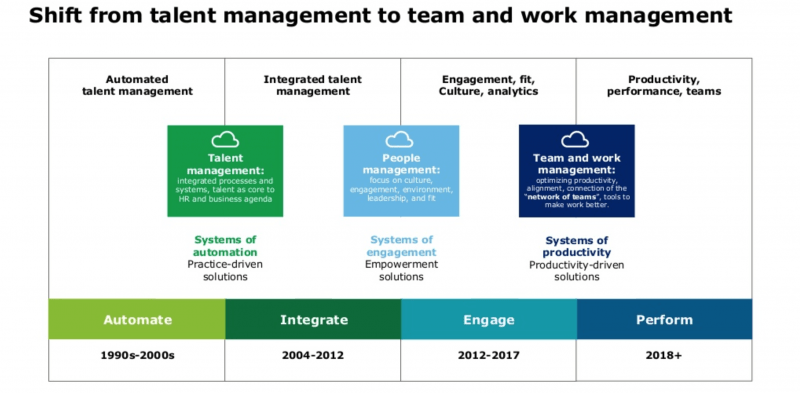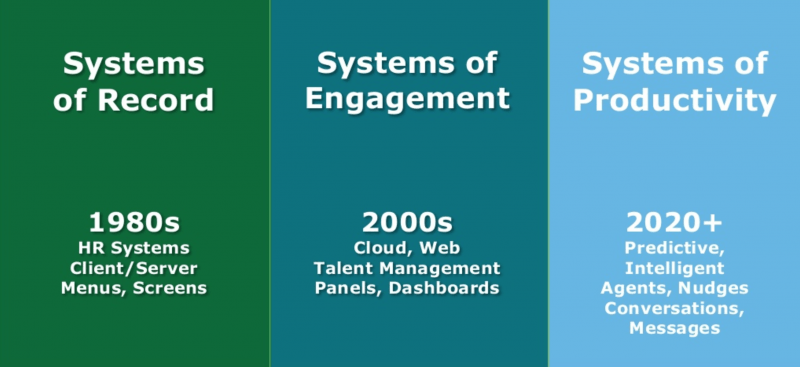Moving From ‘Learning’ To ‘Performance’: Next Generation L&D
A trend I’m seeing more and more, and which is reflected in the latest Bersin By Deloitte ‘Market Trends’ Keynote [1], is L&D’s shift in focus from ‘learning outcomes’ to the complex and individually experienced reality of the work itself.
Senior L&D leaders generally recognize this already. Many conversations they’re exposed to at board-level seek to address actual performance and organizational capability to meet current and future needs. I know this from my years at Disney—and I knew, then, that training programs and eLearning were not a reliable means for real performance improvement. They were isolated events that might have helped prompt reflection and some modicum of change. But as a way of actually helping people with their work responsibilities and career progression, it was more out of hope that programs would deliver the required results. And this is what I’m hearing even more of in the market today.
When we talk about ‘learning’, we talk about how it’s nourishing, and that we help people to grow. We contribute to the well-being and provide well-regarded experiences—as well as some rarely appreciated eLearning. But we’ve reached a point when this isn’t enough.
The point of L&D is to affect performance, from day one with induction, to technical and core skills, transitions and change. There is a real need, both for the individual and the organization, for L&D to help elevate performance, as well as individual and organizational capability. I know this. We all know this. But somewhere along the line, we’ve got stuck running programs.
Haven’t We Always Focused On Performance?
If we all know what we’re ultimately accountable for, how come we’ve got so lost in learning?
We are learning experts. We know how adults learn. We know how to find learning needs. We design learning programs with exercises designed to accelerate and embed the learning. We ‘measure’ the transfer of learning. We try to help our clients become better learners. We are Learning and Development, so this makes sense, right? There is logic to it. But the name is misleading. Our remit—and the real need— is performance and capability, isn’t it? Or to completely de-jargon: Helping people do their best work today whilst making sure the organization has people who are ready to do the work required tomorrow.
We’ve become so transfixed with the learning element that we’re not seeing the opportunity to become performance and capability experts. This is a completely different conversation, with different means of analysis, different activities, and a completely different set of measures.
Why The Shift?
The conversation about L&D is shifting as leaders and workers now have instant access to near limitless information, know-how, and expertise. Work—and the broader contexts of business, technology, and society—present new challenges, daily (it seems), and the old paradigm of ‘requesting and attending a course’ seems more and more impractical—and out-dated.
However, ‘training’ is still requested by our clients as if it’s always delivered returns, which adds a level of confusion and inconsistency to this message. But doing something because it’s popular, despite its inefficacy, is the reason there needs to be a team in organizations responsible for the remit of L&D (performance and capability), not just to take orders or comply with requests but to make sure the people and the company are really ready to perform.
With a refocus on ‘performance and capability outcomes’ our approaches are likely to become more targeted and collaborative as well as measurable, unlike the dark art of trying to measure learning.
How The Shift Is Manifesting
This change is represented in the Josh Bersin Keynote [2], in different ways. In relation to HR technology, he talks about the shift from talent management towards team and work management, focusing today on systems of productivity and making the work better.

The rationale for learning technology has shifted too, from simply a system of record (the primary purpose of the traditional LMS), towards engagement (the purpose of the modern LMS), towards systems of productivity, and a new breed of technologies aimed at affecting the work itself by being user-centric, not just in design but also in application.

To this point, learning technology has served L&D, often to the detriment of end-users, in pursuit of ‘better learning’. This has alienated our clients who have turned to web-search and their own trusted online sources to find the support and guidance they need.
6 Things To Do Now And Refocus On Performance
1. Retire The Training/Learning Needs Analysis
The LNA (TNA) is designed to look for ‘problems’ that need solving with ‘learning solutions’ (mostly training). But this is not the language of business. Instead, performance consulting will help you to recognize what really needs your attention and align efforts to resolving these in the most efficient and effective ways possible[3]—with as well as for the client. The learning needs analysis was a handy way of aggregating common development needs and allocating a standard program but it largely answered the question of scale, rather than performance. So, retire it and focus on performance at the outset of the conversation.
2. Assess What’s Really Working
If you run a schedule of programs just because you’ve always run a schedule of programs—and they’re always full—it doesn’t mean it’s working. Find out from those who have registered to attend what they are really hoping to achieve from their attendance. As a continuation of performance consulting, try to find out what real problems people are seeking to solve in their work. In addition, investigate and analyze what penetration you have with your solutions: What percentage of your organization is engaging in your face-to-face and online offerings? Business today needs a high-level of participation, otherwise L&D is a peripheral function and not affecting much performance or capability directly. If you are affecting a minority of your organization in meaningful development then you need to reassess and re-align to where there is a genuine need.
3. Provide Support And Guidance In The Flow Of Work
If there’s one thing we know about learning, it’s that real learning happens whilst doing. By helping people when they are faced with real challenges, we can find out where they are not supported sufficiently and provide digital resources to help plug common gaps. This will help us to get close to the work and influence how it’s done. This should be the Holy Grail for L&D!
4. Be Where Your People Are
This doesn’t just relate to desktop, mobile or classroom, but means situationally. What are the challenges people are facing and questions they’re asking in relation to their work and careers? How can you connect with them? Are you relying on them visiting your LMS or another portal? Smart service providers today alert users to further value, with notifications and campaigns. If you know your people, you can run campaigns to alert them to real value in their contexts.
5. Use Technology To Solve Problems For Your Clients… Not For L&D
The LMS has been developed to track user-engagement in L&D through attendance, completion, assessment, and satisfaction—and eLearning has helped to scale the efforts of L&D. But whilst workers are striving to achieve results at work, this L&D technology provision has largely been a distraction. Digital technologies today should help L&D to achieve its goals by getting closer to users—and their work—and solving real problems for their clients. If you’re following the steps above, it will be clear what you need digital technology to do for you.
6. Measure And Report On Performance
Performance consulting will highlight the performance problems to be solved, and then measurement—or progress and milestones towards solving these problems—becomes possible and more valuable than ‘learning metrics’. These will be bespoke measures, depending on the current level of performance and the desired level, although some more generic performance measures could include:
- Readiness to perform with confidence and competence (new starters or those transitioning inside your company)
- People’s ability to perform in their role (growing in the role)
- Readiness for future roles (promotions and internal change)
- Applying the right judgments (when complying with regulations and standards)
Producing written or video case studies will highlight the value of your efforts in improving performance and developing capability, whilst encouraging other leaders and departments to engage in performance conversations. Case studies can explore the real problems you tackled, your approach and results that matter to business leaders.
In addition, retrospectives can help you and your team learn from your work on resolving performance problems. The ‘retrospective’ is a meeting [4] used in Agile Project Management in which the team discusses the ‘just-concluded project’ and determines what could be changed that might make the next one more productive.
References:
- The HR Technology Market: Trends and Disruptions for 2018
- HR Tech 2017 Keynote 53 The HR Technology Market: Trends and Disruptions for 2018
- Why you should be using performance consulting to address performance and capability gaps
- Retrospectives









